THE INTERVIEW
Ukraine: A glut of famines and genocides ‘allows no right to forget’ – Yushchenko
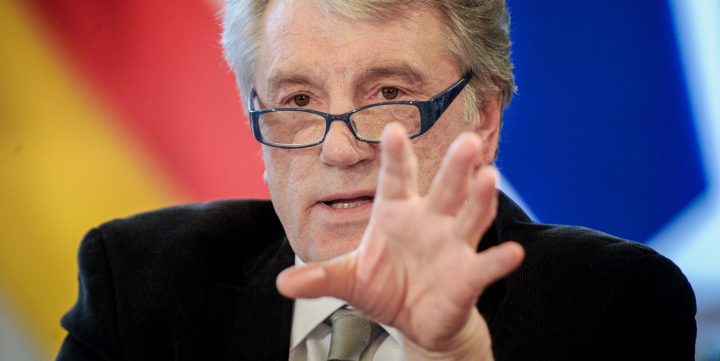
Former Ukrainian president Viktor Yushchenko reminds South Africans what Russia has done to his country.
A genocide in 1932-33 and an attempted genocide unfolding now. These are the bookends of Ukraine’s history with Russia over the past century, says Viktor Yushchenko.
“Nothing changes in Russia,” he says.
The former president of Ukraine is talking to us on a park bench. Not an ordinary park bench. This one was installed in Cape Town’s De Waal Park by the Ukrainian Association of South Africa on Ukrainian National Holodomor Day, the fourth Saturday of November 2021.
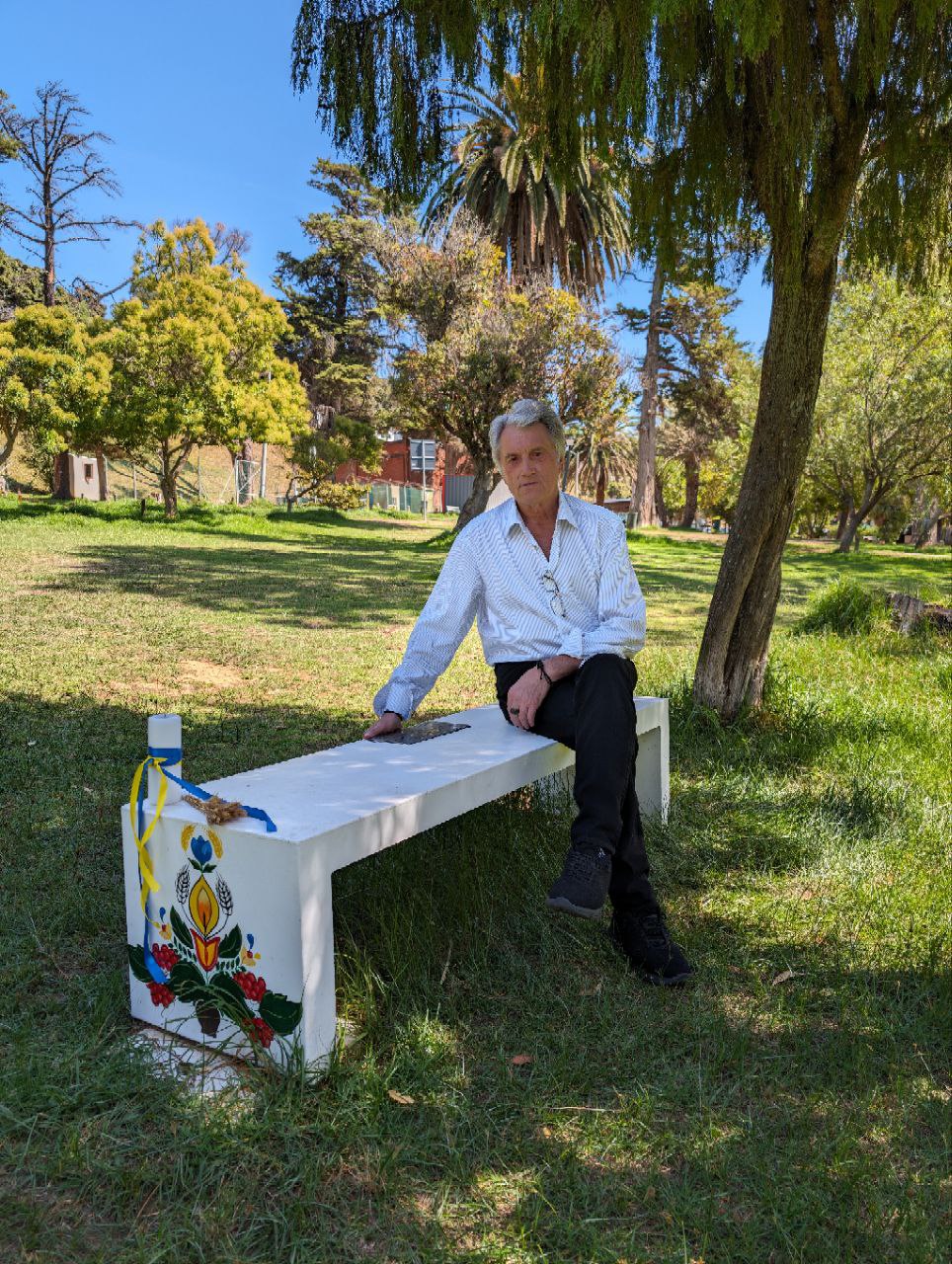
Former Ukrainian President Viktor Yushchenko at the Holodomor memorial bench in Cape Town’s De Waal Park. (Photo: Ukrainian Association of South Africa)
The plaque on the bench reads: “In memory of the millions of people of Ukraine who perished in the man-made famine-genocide of 1932-1933 known as the Holodomor – death by starvation.
“And in solidarity with the victims of genocides on the African continent.
“For the sake of a sustainable future, we have no right to forget.”
At least five million people died in the USSR between 1931 and 1933 from famine caused by Josef Stalin’s forced collectivisation of farming. Of those, more than three million were Ukrainians.
The historian Anne Applebaum, among many others, has argued that they were not the accidental victims of bad policy; Stalin deliberately set out to kill many Ukrainian people in the hope that it would also kill their independent spirit.
In other words, it was genocide by starvation – Holodomor.
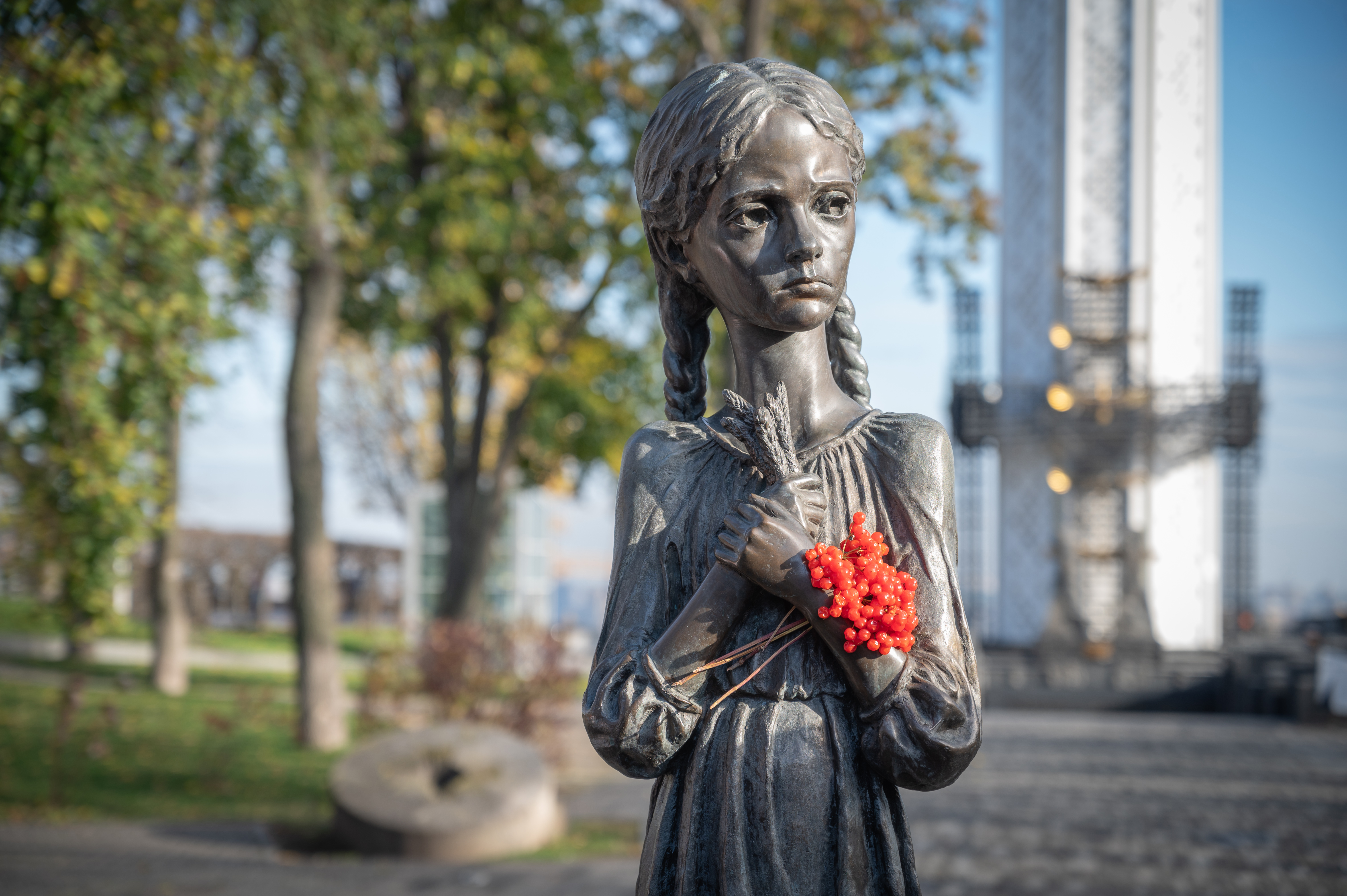
The statue ‘Bitter Memory of Childhood’, at the Holodomor Museum in Kyiv, commemorates the 3.5 million children killed by starvation during the genocide of the Ukrainian nation in 1932 and 1933, as well as of those who survived but did not have a childhood. (Photo: Olexiy Nazaruk, Ukrainian Ministry of Foreign Affairs)
Read more in Daily Maverick: ‘Hallmarks of genocide’ in Russian crimes across Ukraine, Ukrainian prosecutor says
Yushchenko was visiting South Africa to raise awareness of the plight of his people who are now enduring their third year of death and destruction defending themselves against the Russian forces President Vladimir Putin ordered to invade Ukraine on 24 February 2022.
‘A page of our identity’
For Yushchenko, there was a special meaning in visiting the bench in the park.
He ran for president in 2004 partly to shift Ukraine closer to the European Union. His main opponent, Viktor Yanukovych, wanted instead to move Ukraine closer to Russia – and was supported by Putin.
Yushchenko survived an assassination attempt by poisoning (a method favoured by Putin) during the campaign. He remained well ahead in the opinion polls, but the official electoral authority declared Yanukovych the winner.
Masses of people took to the streets in protest against the official results in what came to be called the Orange Revolution.
Eventually, the Constitutional Court declared the election had been rigged and ordered a rerun – which Yushchenko won.
As president, Yushchenko prioritised the commemoration of the Holodomor.
Read more in Daily Maverick: War in Ukraine
We asked him why he felt so strongly about it and how it was relevant to what is happening in Ukraine today.
“The page in our history that was the Holodomor is a page of our identity,” he replied.
“In the 20th century, we had three famines. In the 1920s, ’32-’33 and ’46-’47. We believe that up to 15 million people died in the three Holodomors.
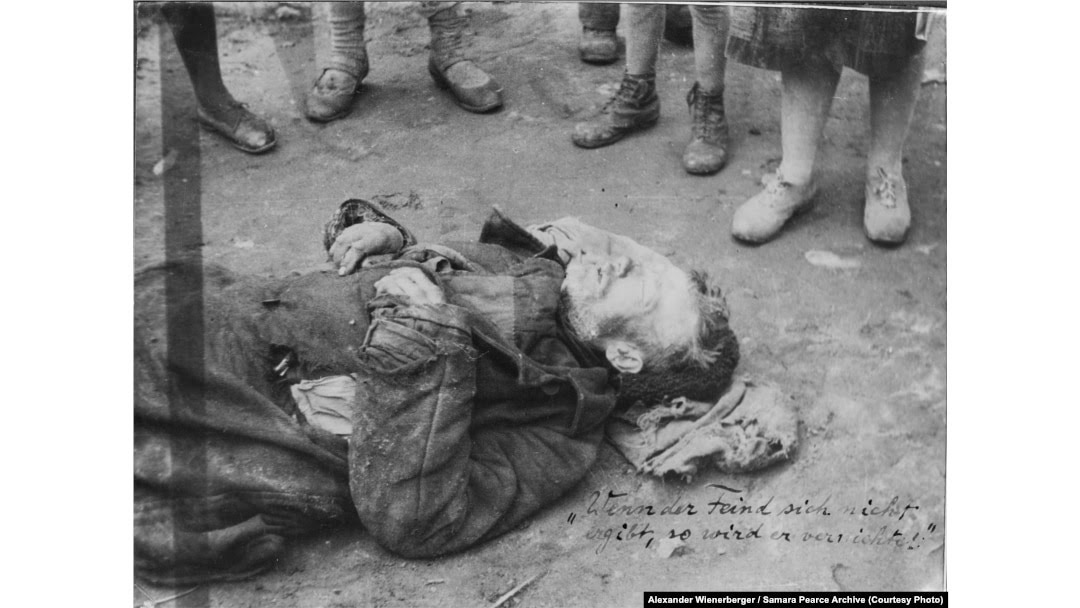
In the 1932-1933 Holodomor, the Soviet police, GPU and military watched millions of Ukrainians waste away and die from hunger. (Photo: Supplied)
“Until 1991, when we got our independence, this topic was forbidden to discuss in our country. This was something that was intentionally done by the Stalinist regime.
“And people were scared to talk about it… to talk about this crime. So the story of the Holodomor was passed down within families, from grandparents to their grandchildren.
“That’s how I learnt about it. And in 1991, when Ukraine finally got its independence, there were yet again a lot of issues that became important, including the issue of national identity.
“People began returning to our national culture, our national heroes. And of course to national memory. And what do you remember first, but the deep tragedies that affected your father or your grandfather or your grandmother?
“But we had not one monument dedicated to the tragedies of the various Holodomors in our history.
“So we began a very difficult discussion with our nation.
“That it would be the right thing to do, to remember this, to recognise it, and to honour it. To honour the victims of this tragedy.
“We began gathering the names of the victims, putting up monuments, creating a memorial complex in Kyiv. Fifteen, 20 years ago, people knew little about this tragedy. But in the last 15, 20 years, the topic has become recognised and better known.
“And in our country, it was something that helped us consolidate the nation in our memory. You know, tragedies unite people if they are remembered.”
Now, he said, the Ukrainian nation understood that “Russia was the author of this tragedy. Just as now they are the authors of the genocide that is killing our Ukrainian children.”
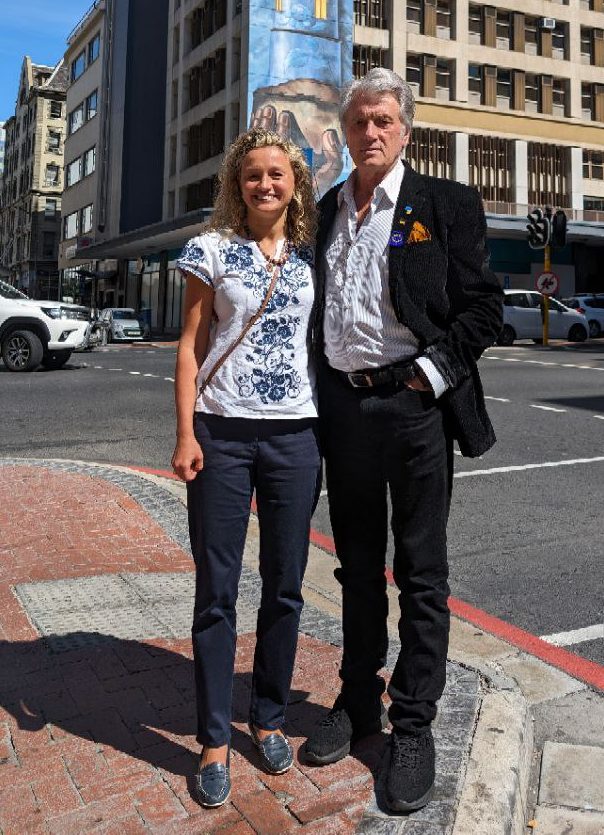
Former Ukrainian President Viktor Yushchenko with Dzvinka Kachur of the Ukrainian Association of South Africa. (Photo: Ukrainian Association of South Africa)
Yushchenko said Ukraine did not know the names or the fates of most of the 700,000 children who had lived in the territories now occupied by Russia.
“International organisations have helped us find the names of almost 20,000 that were taken out through Crimea and other places, so we could actually name them.
“And they are being adopted by force into Russian families.”
Read more in Daily Maverick: Russia tramples international law by abducting Ukrainian children, but South Africa can help get them home – here’s how
He said Russia was also continuing the genocide against Ukraine by bombing cities and murdering tens of thousands of children, women and old people.
“And the first murderer in Russia is Putin himself.
“Just as the 15 million who died in Ukraine, the murderer then was Stalin.
“Nothing changes in Russia.”
‘Important Putin loses’
We reminded Yushchenko that Putin had also ordered his troops to invade Georgia, in 2008. Georgia had negotiated with Putin, and while part of Georgia remains under Russian occupation, it is no longer at war. Shouldn’t Ukraine do the same?
Yushchenko replied that Putin could not be trusted to honour any peace deal.
He recalled that until he invaded Crimea in 2014, Putin had made no claim to Ukrainian territory. And in late 2021, he still claimed he was mustering troops on Ukraine’s borders purely for military exercises.
“You cannot believe a word Putin says. This is somebody who grew up, a thug, on the St Petersburg streets. And the KGB taught him to be a liar, to be devious and clever.”
If Ukraine gave up 20% of its land for peace, Putin would simply see that as a sign of weakness, giving him time to rebuild for future conquests.
Putin was already saying Russia has no borders.
“To Berlin” and “To Warsaw” were now written on the tanks in Putin’s military parades.
Read more in Daily Maverick: Two years on, it’s clear Russia will not stop at Ukraine – unless it is stopped
Empires survive by conquest, he said: “Over the last 400 years, on average the Russian empire has grown 50 square kilometers per day.”
“So that means that if we sit down to a negotiating table with him today, we are betraying our land.”
He emphasised that in Ukrainian President Volodymyr Zelensky’s 10-point peace plan, the first point was “That all Russian troops to the last soldier have to be taken off Ukrainian territory.
“It’s not important just for Ukraine to win. It’s very important for Putin and his policies to lose. Because Russia cannot be left the way it is today. It’s dangerous for all humanity.”
Yushchenko said Putin was the Hitler of the 21st century who brooked no opposition from parliament, the courts or the press.
Any opposition politician who gained popular support, like Boris Nemtsov and Alexei Navalny, was killed.
The international community should only sit down to negotiate with Putin when it has defeated him.
‘Colossal spirit’
We asked Yushchenko, though, whether the apparent growing reluctance of the West, particularly the US, to continue arming Ukraine with the weapons it needs, was not perhaps making it more difficult for Ukraine to avoid negotiating a ceasefire?
“No, I don’t necessarily agree,” he said.
He noted that Ukraine was holding a frontline of 2,300km with Russia, the longest frontline anywhere since World War 2, against a far bigger army. And Ukraine believes it has killed 440,000 Russian troops or rendered them unable to continue to fight.
He said Europe had helped Putin to build such a large force by paying him around one billion dollars a day for some 16 years for oil and gas.
But now Ukraine was being supported by a coalition of 54 states which controlled 67% of the world’s GDP, compared with Russia which controlled 1.7% of the world’s GDP.
It would not be easy but it should be possible for such a large, powerful and unique coalition to provide Ukraine with the weapons and technology it needed to defeat Russian imperialism for everyone’s sake.
“We have the colossal spirit and belief that we’re fighting for our homeland. That we’re fighting for the whole world.”
We asked Yushchenko what he thought of the so-called “non-aligned” stance that the ANC government had adopted towards Russia’s war against Ukraine.
Yushchenko said Ukraine had been part of the Soviet Union which had provided humanitarian aid and support for the liberation struggles in South Africa and elsewhere.
But he added that in the Russian Federation, there were 160 indigenous peoples that had been colonised by Russia.
“The vast majority of which have lost their language, culture, faith. They have all been rewritten in their passports as Russians. And this colonisation and imperialism is one of the most barbaric of the 20th and 21st centuries.
“This country, the Russian Federation, doesn’t give freedom to anyone. You’re deluded, misinformed, if you believe that you’ll receive actual political or security help from this country.
“Russia will only give you a new form of slavery. I believe that there are a lot of countries that still don’t understand this.
“Unfortunately, we think on the African continent there are countries that still don’t understand. On the other hand, I think it’s very dangerous when leaders and states can be neutral to genocide.
“And I think that it’s just elementary solidarity that we should be all together on the side of justice and truth,” Yushchenko said.
“We shouldn’t be neutral to a policy of aggression…”
Nonetheless, Ukraine should have a dialogue with South Africa and the rest of Africa to better understand one another to “be able to work together on a new policy”.
Lessons on SOEs
Yushchenko is an economist who headed the national bank before entering politics. As prime minister to president Leonid Kuchma between December 1999 and May 2001, he played a decisive role in turning around a declining economy.
As president from 2004 to 2010, he also grappled with the problem of how to privatise state-owned enterprises and curb the greed and power of the oligarchs – in some ways the equivalent of South Africa’s tenderpreneurs – who seized so many of them.
We asked him if he had any advice to offer South Africa, which has managed its state-owned enterprises so disastrously.
“First of all, you need to have society understand… that the state is the worst manager of economic enterprises. Second, state enterprises are often supported by national governments because they are the source of corruption and the source of enrichment.”
So, on the whole, business should be taken away from government and given to the private sector.
His government had been “very liberal when it came to the assets that should be privatised… and sold in a fair competition”.
However, certain assets such as military infrastructure that ensured defence and security of the state and some administrative functions should remain under state ownership.
“But these should be a very small percentage of the general economic activity.”
And some types of enterprises, for example in the military or aerospace sectors, could be launched with government investment to get them going. But even that should be for a short time only.
“Because after a while, these systems will basically fall apart if they are managed by the government.”
Yushchenko said his government had reprivatised many enterprises which had previously been privatised, but where courts had proved this had been done criminally. DM




















And now let the pro-Russian protagonists start their tub-thumping and inane, delusional rants…
Hear, hear! He has lived in a “socialist paradise” , unlike our Gucci socialists.